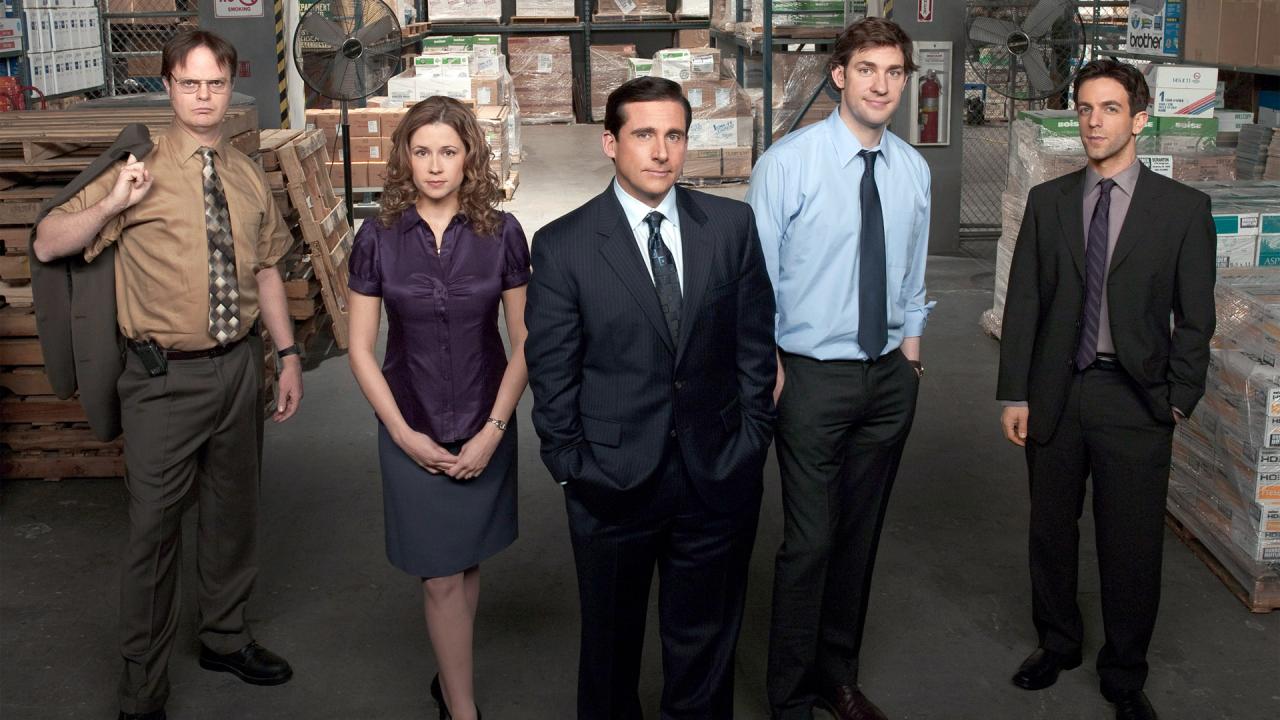
When good TV goes bad: how the American Office downsized its comic potential

American remakes of British comedies are prone to disaster. Failed pilots exist for Spaced, Absolutely Fabulous, Peep Show, The Thick of It (pre-Veep), The Young Ones and The IT Crowd. YouTube provides evidence of some of these bizarre and tone-deaf interpretations.
British humour loves merciless sarcasm, brutal self-deprecation and ink-black irony. It champions losers of epic proportions whose excruciating predicaments make you want to pull your teeth out. Some mainstream American comedy (certainly not all) favours sentimentality and charm, plus a seeming inability to cast any main characters who aren’t pristinely good-looking. So, in 2005, when an American version of cringe classic The Office began, expectations were in the toilet.
The first episode lived down to expectations. It mirrored, often word for word, the UK version. The stapler in the jelly was there, as were the forced and antiquated “wassup” greetings. Watching it was akin to coming home to find a bunch of strangers dressed as your family. They are saying and doing the right things but you want these ill-fitting weirdos out of your house.
Thankfully, the writers saw that this was leading nowhere and ditched the imitation game. Steve Carell’s Michael Scott became an entirely different character to David Brent. Less repellent and more endearing but equally needy and still someone you’d hide from if you saw them outside – or even in – work.
From season two to five, the show became truly itself: developing its own cadence, introducing new characters, and creating a relationship arc between Jim and Pam (Tim and Dawn) that possessed genuine emotional weight. It was a distinctly American show built on quintessentially British foundations but it worked and, indeed, often soared.
Cracks appeared in season six, as consistency dipped and plotlines ballooned. This continued throughout season seven, by the end of which Carell left. The finale looked for his replacement, teasing Jim Carrey, James Spader, Will Arnett, Catherine Tate and even Ricky Gervais, appearing as Brent in a stale, apathetic cameo. Then, Warren Buffett showed up. Gervais even called this himself, writing on his website: “If you’re going to jump a shark, jump a big one.”

The original show succeeded in capturing the suffocating grey aura of the workplace, its painful interactions and insufferable banality. The American Office always had great episodes outside of those drab walls but by season eight, when there was a drunken pool party at the boss’s mansion and entire episodes set in Florida, it became clear the writers had used up the comedic possibilities of the office and therefore the show.
Season nine was loaded with flops, especially one truly awful episode that was a worked-in spin-off pilot based around Dwight Schrute’s family farm. Even Carell seemed bored and awkward as he returned in the series finale, unable to bring life back to a show that was slapped with a Do Not Resuscitate order some time ago.
American remakes of British comedies are prone to disaster. Failed pilots exist for Spaced, Absolutely Fabulous, Peep Show, The Thick of It (pre-Veep), The Young Ones and The IT Crowd. YouTube provides evidence of some of these bizarre and tone-deaf interpretations.
British humour loves merciless sarcasm, brutal self-deprecation and ink-black irony. It champions losers of epic proportions whose excruciating predicaments make you want to pull your teeth out. Some mainstream American comedy (certainly not all) favours sentimentality and charm, plus a seeming inability to cast any main characters who aren’t pristinely good-looking. So, in 2005, when an American version of cringe classic The Office began, expectations were in the toilet.
The first episode lived down to expectations. It mirrored, often word for word, the UK version. The stapler in the jelly was there, as were the forced and antiquated “wassup” greetings. Watching it was akin to coming home to find a bunch of strangers dressed as your family. They are saying and doing the right things but you want these ill-fitting weirdos out of your house.
Thankfully, the writers saw that this was leading nowhere and ditched the imitation game. Steve Carell’s Michael Scott became an entirely different character to David Brent. Less repellent and more endearing but equally needy and still someone you’d hide from if you saw them outside – or even in – work.
From season two to five, the show became truly itself: developing its own cadence, introducing new characters, and creating a relationship arc between Jim and Pam (Tim and Dawn) that possessed genuine emotional weight. It was a distinctly American show built on quintessentially British foundations but it worked and, indeed, often soared.

Cracks appeared in season six, as consistency dipped and plotlines ballooned. This continued throughout season seven, by the end of which Carell left. The finale looked for his replacement, teasing Jim Carrey, James Spader, Will Arnett, Catherine Tate and even Ricky Gervais, appearing as Brent in a stale, apathetic cameo. Then, Warren Buffett showed up. Gervais even called this himself, writing on his website: “If you’re going to jump a shark, jump a big one.”
The original show succeeded in capturing the suffocating grey aura of the workplace, its painful interactions and insufferable banality. The American Office always had great episodes outside of those drab walls but by season eight, when there was a drunken pool party at the boss’s mansion and entire episodes set in Florida, it became clear the writers had used up the comedic possibilities of the office and therefore the show.
Season nine was loaded with flops, especially one truly awful episode that was a worked-in spin-off pilot based around Dwight Schrute’s family farm. Even Carell seemed bored and awkward as he returned in the series finale, unable to bring life back to a show that was slapped with a Do Not Resuscitate order some time ago.
